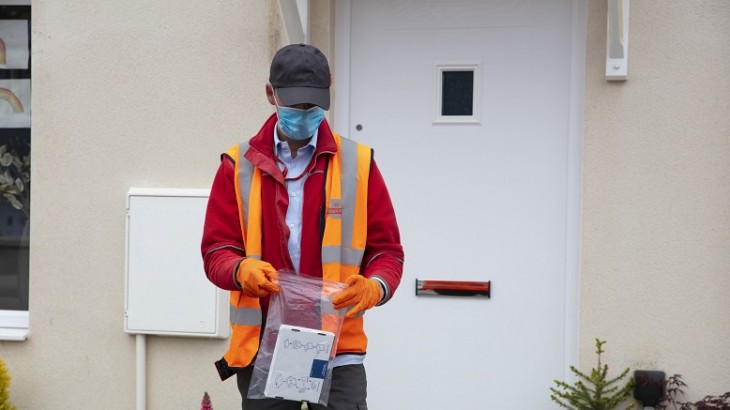Call us in a crisis

Given key worker status at the outset of the pandemic, Royal Mail colleagues are playing a key role in the fight against coronavirus by collecting and delivering test kits. Long before the Government’s latest tier plan, we helped provide local outbreak plans with councils across the country. Here, colleagues in Bolton explain how this worked when the Greater North West town entered a local lockdown earlier this year as one of the worst affected in the country. Zoe Walker has the story…
THE coronavirus pandemic has put Royal Mail under immense pressure. Squeezed from all sides since lockdown began in March 2020, our Operation has seen a decrease in letters alongside a surge in the number of parcels travelling through the network.
At a time of national crisis, Royal Mail has kept the nation connected – by continuing to deliver throughout, and often providing extra care, smiles and familiarity to communities.
Crucially, we’re helping the UK stay safe, too. Within days, we set up a home collection service for Covid-19 test kits. We developed a network of priority postboxes and our bespoke weekend collection service, which began in November, means we can collect the kits seven days a week now.
Most recently, we have won a contract to start delivering test kits to UK addresses, too – also seven days a week.
In September 2020, our role became crucial for residents of Bolton. After a significant spike in coronavirus cases, council chiefs appealed to residents to take responsibility to reduce the rate of infections, with Bolton Council leader, Councillor David Greenhalgh, stepping in to urge people to adhere to guidelines.
We were ready to help, and Bolton became the latest part of the UK to benefit from our local outbreak action plans.
Consultation took place between Royal Mail and the local council about an increase in the collection and delivery of test kits to support the fight against coronavirus. Our network provided a perfect, ready-made way to get test kits swiftly and safety to labs in the area. Managers in Bolton swung into action to make it work.
Julia Bateson, collection area manager at Manchester Mail Centre
‘If there is a spike area – like in Bolton – the council will go and hand test kits out at certain facilities. This could be a supermarket or a certain chemist and they will then point the customers to certain boxes.
‘They will pinpoint boxes to Royal Mail and we’ll then put increased collections on there and record on a daily basis where we have got to pick the test kits up from. That way they can see a touch point in their councils and understand where the infection is likely to be so that they can pinpoint and focus their testing on that area.
‘There has been a lot of planning. Even down to identifying the boxes that we are going to use – we had to go out and measure the apertures of our postboxes, just to make sure that these test kits would go in. Then we had to understand where they were – making sure that they were not inside supermarkets or near schools and they were not in confined spaces. For example, we made sure that we did not use the Trafford Centre because we did not want people to be going into the Trafford Centre that believed they were positive and having a test and posting it in a postbox there. We had to be really mindful of where they were going.
‘Colleagues were concerned about test kit collections at first – but when we were setting this up, we set up a local working group with our programmes manager, area collection manager, the CWU, safety teams and our SHE advisor.
‘We had a training process so that everybody who opens a box is fully trained on the test kits. We show them: the sample stick that goes into the sealed bag and then that goes into a box – so it has got three layers before we even get to it.
‘Colleagues definitely feel ‘part of it’. Everyone is going to look back on 2020 and think – apart from it being horrendous – “I actually did something good about that, I supported the country”. It has been an unusual time, but it has brought a lot of units together.’
Alan Gidman, mail processing manager at Bolton Mail Processing Unit
‘Covid-19 has made things difficult - it is hard to plan anything. You are reacting every day to unknowns. ‘For test kits, we get our report in the morning. We will go into our systems and it will tell me what needs collecting and I’ll arrange for someone to go and collect it.
‘Our numbers spiked when the council started delivering to home addresses randomly. They were going door to door, asking: “do you need a test?”. From that point it really spiked. We were going from 50 a day, to scanning anywhere from 100 to 200 a night. During that period in September when Bolton was the worst affected in the country – that was around the time that we really peaked. As we are getting more information coming in the media, it makes more people get tests.
‘Colleagues here have been brilliant. You can understand, when we started there were real concerns about picking the kits up – but we had our briefs, training and we have protective equipment. Through this pandemic we have cleared every day. So that has given us a good base to make this successful as well.
‘I think good engagement, a good work ethic and a good structure are the keys to our success as a team.’



